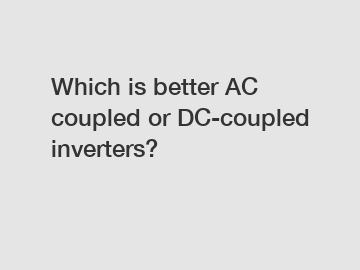Which is better AC coupled or DC-coupled inverters?
Which is better AC coupled or DC-coupled inverters?
In the world of solar energy, the choice of which inverter to use is crucial. The debate between AC coupled and DC-coupled inverters has been ongoing, with proponents on both sides advocating for the superiority of their chosen technology. Both alternatives have their unique advantages and disadvantages, and understanding these nuances is essential in making an informed decision. So, let's delve into the topic and explore the merits of each option.
First, it's important to understand the basic functionality of inverters. Inverters are devices that convert the DC (direct current) electricity generated by solar panels into AC (alternating current) electricity, which is the standard form of electricity used in homes and businesses. AC coupled and DC-coupled inverters differ primarily in terms of where they are placed in the solar energy system.

AC coupled inverters are typically installed after the primary inverter responsible for converting DC electricity generated by the solar panels. They are connected directly to the electrical distribution system of a building and provide additional functionality such as energy storage or grid integration. On the other hand, DC-coupled inverters are installed directly at the point where the solar panels are connected to the system, converting DC electricity into AC electricity at this stage itself.
Now, let's explore the advantages of each approach:
AC Coupled Inverters:
1. Flexibility: AC coupled inverters allow for greater flexibility in terms of system design. Since they are installed after the main inverter, they can easily be added or upgraded without significant modifications to the existing solar energy system. This flexibility makes them ideal for expanding or retrofitting an existing setup.
2. Energy Storage Integration: AC coupled inverters are commonly used in combination with battery storage systems. This setup allows for efficient utilization of stored energy during times of high demand or when the grid is down. The ability to integrate energy storage solutions makes AC coupled inverters a popular choice for those interested in maximizing their energy independence.
DC-coupled Inverters:
1. Higher Efficiency: One of the key advantages of DC-coupled inverters is their higher efficiency. By converting DC electricity into AC electricity directly at the point of connection, these inverters minimize energy losses that may occur in the transmission between panels and the main inverter. This higher efficiency can result in improved overall system performance.
2. Cost-effectiveness: Due to their simpler design and installation requirements, DC-coupled inverters are often considered more cost-effective compared to AC coupled inverters. The reduced number of components and wiring needed can lower the overall system cost, making them an attractive option for those with budget constraints.
While both AC coupled and DC-coupled inverters offer unique benefits, there are a few points that need to be considered when making a decision:
1. System Size and Integration: The size of the solar energy system and the need for additional functionalities such as energy storage should be assessed. AC coupled inverters are more suited for larger systems, especially when there is a desire for seamless integration with energy storage solutions.
2. Efficiency vs. Cost: Consider the relative importance of efficiency and cost-effectiveness. If maximizing energy production and minimizing losses is a priority, DC-coupled inverters may be the preferred choice. However, if budget constraints are a significant factor, AC coupled inverters could be a more viable option.
In conclusion, the decision between AC coupled and DC-coupled inverters ultimately depends on specific requirements and priorities. While AC coupled inverters offer flexibility and energy storage integration, DC-coupled inverters boast higher efficiency and cost-effectiveness. Evaluating the system size, integration needs, and the balance between efficiency and cost will aid in choosing the better inverter option for a particular solar energy system.
For more senergy industrial solutions, 3 phase inverter for solar panels, solar inverter clippinginformation, please contact us. We will provide professional answers.
227
0
0

Comments
All Comments (0)